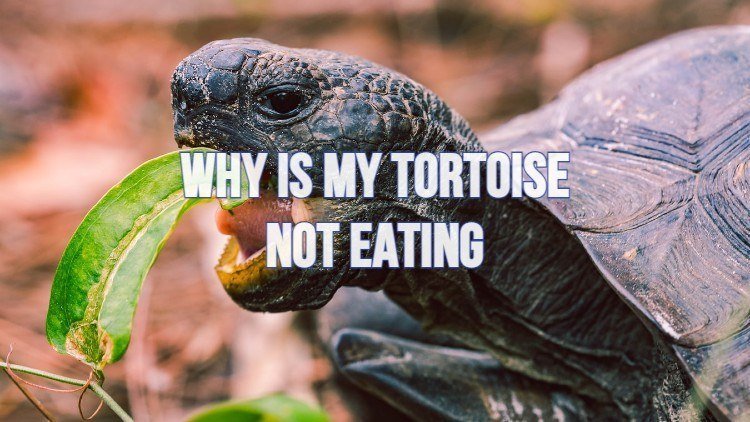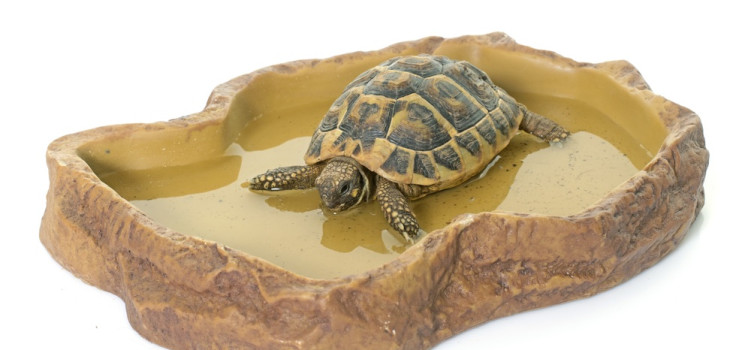To help a tortoise that is not eating, take it to a veterinarian as soon as possible. This can be a sign of illness and requires professional attention.
Tortoises can make great pets, but it’s essential to take proper care of them. One of the most important aspects of caring for a tortoise is ensuring that they are eating properly. Unfortunately, there may be times when your pet refuses to eat, which can be concerning.
A lack of appetite can be a symptom of various illnesses, such as dehydration, metabolic bone disease, or pneumonia. In this article, we will discuss some reasons why your tortoise may not be eating and what you can do about it. Remember, if you notice any changes in your pet’s behavior, it’s best to consult with a veterinarian immediately.

Credit: thepetenthusiast.com
Understanding Tortoise Eating Habits
Tortoise eating habits can vary greatly depending on several factors including age, species, and the environment they live in. It is important to understand what a healthy appetite looks like for your particular tortoise and what might be causing a decrease in appetite.
If your tortoise is not eating, consider factors such as their current temperature and lighting conditions, as well as any recent changes to their diet or environment. It may also be a good idea to have them checked out by a veterinarian.
By understanding and monitoring your tortoise’s eating habits, you can ensure they stay happy and healthy for years to come.
Identifying The Problem
When your tortoise is not eating, it can be a cause for concern. Identifying the problem is essential to address the issue. Common causes of loss of appetite in tortoise could be due to stress, illness, poor diet, or other environmental factors.
Some symptoms of a starving tortoise include weight loss, lethargy, and dehydration. If you notice any of these signs in your pet, it’s time to take action. Consult with a veterinarian, adjust their diet, and create a stress-free environment for their recovery.
With proper care, your tortoise should be back to their healthy, happy self in no time.
Responding To The Problem
It can be concerning when your tortoise refuses to eat. Firstly, evaluate the environment, as stress can affect appetite. Ensure that the temperature is correct and that there is enough light. Offer water and greens, and monitor their behavior. If the problem persists, consider a visit to a veterinarian who specializes in reptiles.
Be wary of medication, as tortoises are sensitive. They may need antibiotics or fluids if dehydrated. Parasites can be another issue. A fecal exam can confirm this, and medication will be prescribed. Take note of these steps and consult an expert if the situation persists, as tortoises have specific needs when it comes to their appetite and health.
Diet And Feeding Tips
When your tortoise refuses to eat, it can be concerning. An ideal diet for tortoise includes grass, hay, weeds, and vegetables, and occasional fruits. Offer a variety of food and ensure they are natural and fresh. Avoid giving tortoise feeds meant for other species.
Healthy tortoise feeding tips include monitoring their portions, feeding them on regular intervals, keeping their food clean and well-cut, and providing them with constant water. Furthermore, ensure your tortoise is within its required temperature range and providing them with adequate light and full-spectrum uvb lighting.
Offer calcium and vitamin d3 supplements and a total diet with the correct ratio of calcium to phosphorus. Do not offer large portions of protein, and avoid feeding the tortoise any hazardous plants or fruits. Contact a vet if the tortoise continues to not eat ter long periods.
Frequently Asked Questions For What Should I Do If My Tortoise Is Not Eating
Why Is My Tortoise Not Eating?
Tortoises may stop eating due to stress, a change in environment, illness or incorrect temperatures.
How Long Can A Tortoise Go Without Eating?
If your tortoise stops eating for more than 2 weeks, take them to a vet immediately.
What Are The Common Illnesses That Stop Tortoises From Eating?
Respiratory infections, parasites, mouth rot, abscesses, and organ failure can cause a loss of appetite.
How Do I Encourage My Tortoise To Eat?
Offer fresh and varied foods, change the environment, add more natural light or uvb, and make sure that the temperature and humidity are correct.
What Foods Should I Feed My Tortoise?
Tortoises mostly eat leafy greens, fruits, vegetables, and flowers. Avoid foods high in protein or fat.
How Can I Prevent My Tortoise From Losing Its Appetite?
Maintain proper temperatures, lighting, and humidity in their enclosure, clean the enclosure regularly, and provide a varied and healthy diet.
Conclusion
Overall, it is important to stay vigilant and proactive when monitoring your tortoise’s eating habits. If your pet’s appetite drastically decreases or they stop eating altogether, it can indicate an underlying health issue that needs immediate attention. Some potential causes could include illness, stress, improper diet, or a change in environment.
By taking a few simple steps, such as adjusting their diet, offering different food options, creating a comfortable living space, and seeking the help of a veterinarian when needed, you can help ensure your tortoise remains healthy and happy. Remember, prevention is key, and the earlier you address any issues, the better chance your tortoise has for a full recovery.
With patience, persistence, and a little bit of care, you can help your tortoise get back on track to a healthy life.






Leave a Reply